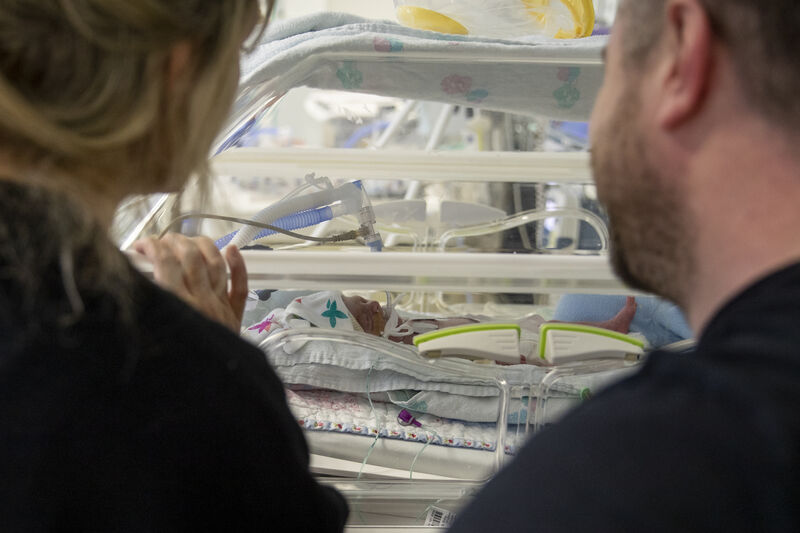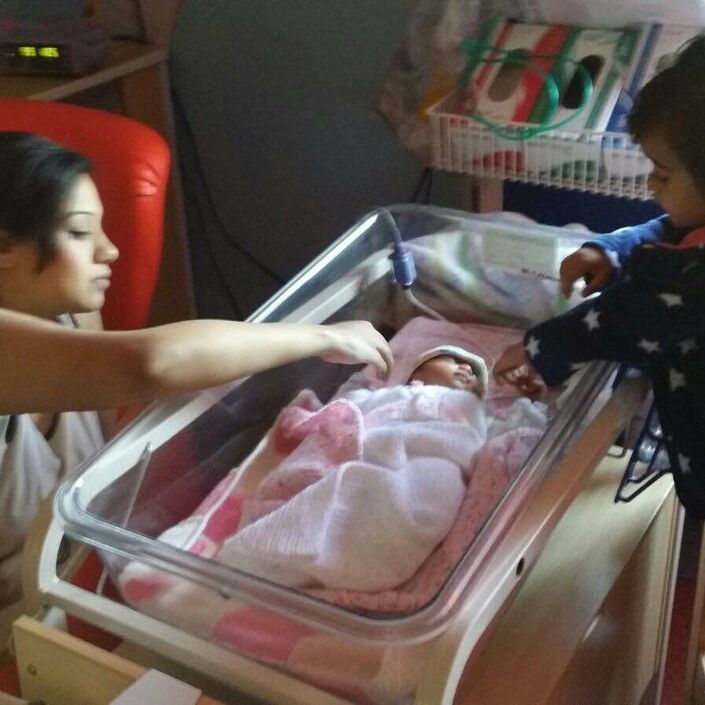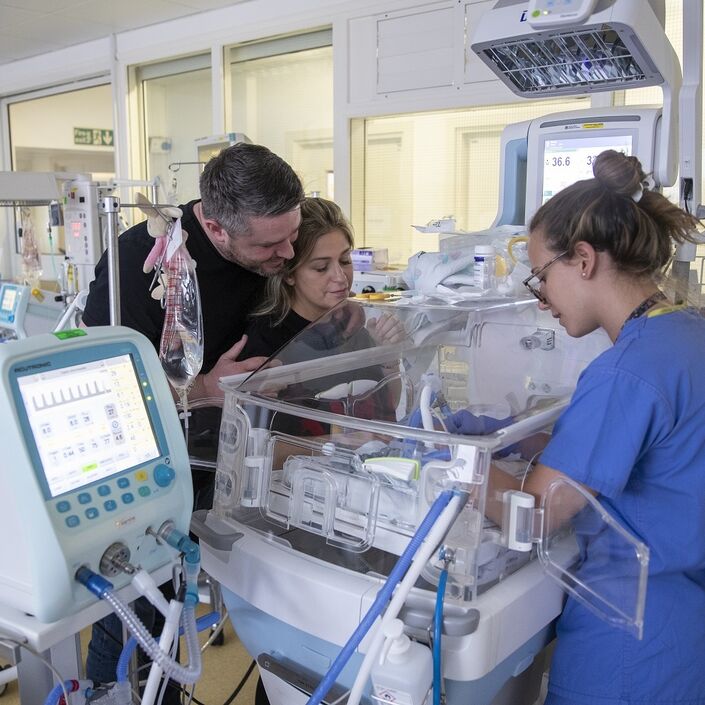Not feeling confident
We often hear that at first, parents can feel overwhelmed at the idea of taking care of their baby on the unit.
Even if you have had children before and know what to expect from taking care of a baby, doing so on the unit can feel very different.
It is usual for parents to feel this way. But being involved in your baby’s care can help you feel more confident, as well as helping your baby know that you are there.
Getting involved can make you feel more confident to:
- Hold your baby
- Get used to handling them around wires
- Change their nappies
- Do skin-to-skin
- Feed your baby in the best way for you
- Recognise what makes your baby more comfortable
- Know that your won't hurt them by holding them or getting involved
You can do what is right for you. There is support to help you get involved as much as you would like. You might like to give these ideas a try:
Talk to the staff on the unit about being involved.
They will help explain things that you are not sure of. They can also help reassure you if you are worried you don’t know how to do something.
Get involved gradually – maybe one day you’d like to do skin-to-skin with your baby, and the next you’d like to learn how to change their nappies. Taking things day by day can help you feel more confident.
If there is something you would like to do, always ask,
even if you think it might not be possible. If your baby is not able to breastfeed, for example, the staff will help you feed in a different way which still involves you and helps you to connect.
Remember that you don’t have to do anything you don’t feel comfortable with. Staff will encourage you to get involved because you are your baby’s parent. But if they ask you to do something you don’t feel happy doing, let them know.
You can take your time to find the right routine for you and your family. This will be different for everyone.
Being unwell yourself
If your baby is in the neonatal unit, you or your partner might be recovering physically and emotionally from the birth.
This can mean that you’re not able to spend as much time as you would like on the neonatal unit, especially if you’re recovering from surgery.
If you’re feeling unwell, with cold or flu like symptoms, or if you have been sick or had diarrhoea in the last 48 hours, you will be asked not to come to the unit until you are better. This is to protect the babies from infection.
We also know that being on the neonatal unit can have an impact on parents’ mental health. This might mean you aren’t able to be with your baby, or get as involved as you would like.
Ask the staff on the neonatal unit to help you get involved. Even if you can’t be there in person, they can help you feel more involved and connected by doing things like:
- Giving you pictures of your baby
- Updating you regularly on how they're doing
- Asking if you or your partner would like to give expressed breastmilk to feed your baby, if that's something you've chosen to do
- Asking for any clothes you'd like your baby to wear, if they're well enough
- Helping you to spend time with your baby as soon as you are able
- Ask the staff how to get other family members involved
Going back to work
If you or your partner need to go back to work, this can have a big impact on how often you can be around your baby when they are still on the unit.
Many parents can find that they struggle to balance work and visiting their baby if they have had to take parental leave earlier than expected, or if their leave allowance runs out whilst their baby is still in hospital.
Worrying about money and finances can also impact parents. Having to think about the everyday life whilst also having a baby in hospital can feel exhausting and stressful.
You can ask for support. You might like to try some of these ideas to help:
Talk to your employer about taking some extra time off, if that’s an option. Some employers might be able to let you work more flexibly too, once you do go back.
Talk to the staff on the neonatal unit.
Even if you can’t be there in person, you can feel more connected by trying some of the ideas above.
If you have worries about finances, ask the staff on the unit if they have any policies which might help, for example free parking for parents visiting the unit, or vouchers to help towards meals.
You can also take a look at our list of organisations which offer help and support with finances.
Looking after your other children
If you have older children who need looking after, this can add complications to your daily routine and affect how flexible you are to spend time with your baby.
You might also feel guilty that you’re not spending enough time with your older children, and that they are missing you being around or feeling left out.
It can be challenging if you’re not able to spend enough time with your baby on the unit, because you are taking care of, or spending time with, your older children.
We often hear parents say they feel caught between different priorities. It is usual to feel this way when you have a lot of things to balance.
There is support for you. Feeling this way, or asking for help, does not make you less of a parent. You might like to try some of these ideas to help you feel more supported:
Ask your unit if your other children can visit your baby with you. Many units will encourage your whole family to spend time getting to know your new baby. This can be a great way to make memories and explain to older children why things have changed recently.
Ask for support from your friends and family. Often people want to help but they don’t know how. Asking them to pick up older children from nursery or school, or looking after them whilst you visit your baby can really help when you are trying to balance lots of things.
When you are with your older children, ask them to write a letter to the baby, or maybe draw a picture for them. This can help them feel connected to the baby. It can also be a nice way to spend quality time with them.
Find out more about talking to your other children here.
Cultural, religious or language barriers
With some parts of getting involved with your baby’s care, you might find that some cultural, religious or language barriers make this harder.
If English is not your first language, you might feel you don’t have a good understanding of what is happening with your baby.
Doing things like skin-to-skin, or breastfeeding might also be difficult if you do not feel comfortable removing some of your clothing in an area which might not be completely private.
You might also not know where you can pray, if this is a regular part of your day.
It can also be difficult to know where you can get food if, for example, you eat a halal, kosher or vegan diet.
There is support for you.
Talk to the staff on the unit about how they can help you overcome anything which is making it harder to spend time with your baby:
If English is not your first language, ask the staff on the unit to find an interpreter. It’s important that you understand your baby’s care, and the unit will help you to access information in your native language.
Ask the staff on the unit for screens or private space
to breastfeed or give skin-to-skin if you do not want to do this around other people, or would like more privacy to be with your baby.
Ask for more information on prayer spaces and what religious support is available through the hospital. This might be through a chaplain or multi-faith support. They can also help support you if you would like to perform a religious ceremony to mark your baby’s birth, such as a baptism or naming ceremony.
Ask what food is available in the hospital for parents, and where you can get alternatives if your diet is not catered for.



